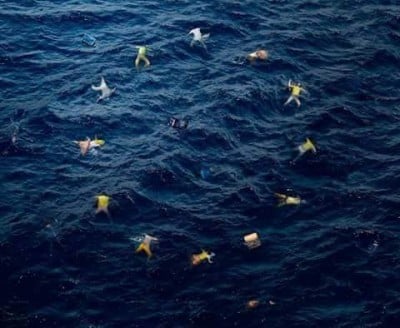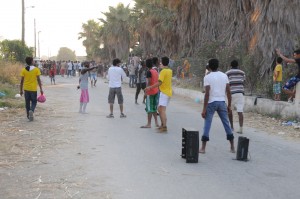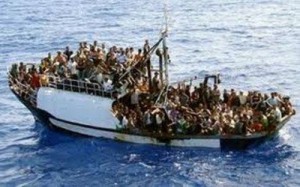Refugees, “Let Them Pass”, Ensure Safe Passage: Overloaded and Capsized Boats to Greece’s Islands …

We write from a workplace 350 metres up a Samos mountainside overlooking the north coast.
We have an uninterrupted view of the coast of Turkey (10 -15k away) and the Aegean Sea which separates us from the mainland.
This is where we were in May 2014 looking with dismay at a capsized yacht in which over 23 refugees were trapped and drowned whilst locked in the cabin.
This is where we have seen over the past eight years pathetic rubber inflatables make for the Samos beaches overloaded with refugees. This is where today we look down and see the orange dots of the life vests which mark the latest arrivals overnight.
One of our most pressing questions is why are refugees still being compelled to enter Europe in this way? After all these years?
When so many have died and will continue to die until safe passage is provided.
It now seems that many people throughout Europe – if not their governments – are wanting to help the refugees. Surely this sentiment must embrace putting an end to these murderous journeys across the sea in rubber boats as well as all the barriers which have been put in place which makes their escape so difficult? Nevertheless, these important humanitarian sentiments have yet to result in a powerful and overwhelming campaign for safe passage into Europe. Amongst all the shames of Europe its refusal to open its borders to these refugees stands out in its callousness and cruelty.
We recently viewed a very moving interview with a Syrian man. He, his wife and six children were packed in the inflatable bound for the Greek frontier island of Chios. No life jackets as they were told the sea conditions were good and it would only be a 15 minute trip. The boat capsized and Hassan lost all his family. He was destroyed. Why he and his family were having to travel this way when there is a daily ferry connection between Chios and Turkey was never mentioned. We see the same failure in a great number of the photographs and clips of refugees landing on the beaches from their pitiful boats. Why? Why are they being made to chose this way to find themselves a new and safer life? Why is this question so often ignored in otherwise sympathetic accounts?
What it is happening is totally unacceptable and criminal. It must be changed. The border between Turkey and Greece is closed to the refugees. But closed borders have not stopped the refugees. Neither here, nor through the Balkans. Instead closed borders only make their journeys more dangerous and expensive.
We have seen and talked with many refugees who have made it ‘safely’ trying the best we can to meet some of their pressing needs. Many arise from their crossing: losing shoes, backpacks, money, and developing sores from hours sitting or crouching in the waterlogged inflatable. None of this would be necessary if there was safe passage.
We remember talking to a young Palestinian who with his wife and 1 year old baby had just landed safely on Samos. They were fleeing from a Palestinian refugee camp near Damascus. “When we got in that boat to cross we were terrified but we had no choice. That’s why we are here.”
You don’t need to spend very much time talking with refugees to discover some basic truths common to the majority of refugees wherever their origin. First off they don’t want to be refugees. They want to live in their own homes and in their own country. They are desperate for the wars and plunder, chaos and insecurity to end so they can resume their lives in safety. Many leave because they see no prospect of this happening. Their lives have often been disrupted for years before they decide they can take no more, whether it is in a refugee camp in Jordan or Turkey, the streets of Istanbul, or in the villages and towns of Afghanistan, Syria, Iraq, Iran, Yemen, Congo and so on. They thirst for normality, to restart their lives and to live without fear.
Many refugees believe that this is what Europe offers: an opportunity to live again, to rebuild a life with a future and above all to be safe.
But it is not the attractiveness, real or imaginary, of Europe that pulls a young Palestinian family into an overloaded and unsafe inflatable to make the risky sea crossing to Samos. Rather it is the impossibility of staying home and of counting for nothing and unable to see any chance of improving their situation which pushes them: Always a victim and often in danger.
Borders and Selection
There are many reasons why we should be focusing on safe passage. The first and most pressing is the suffering caused by making their escape so dangerous, expensive and difficult. Others include the need to challenge the whole issue of borders and to support the refugees who have moved across Europe trampling borders in the process.
By sheer weight of numbers the refugees have overwhelmed Europe’s borders. For six months or more, as we have seen in Samos the authorities have been in confused chaos. There can be no excuse for their lack of preparedness which has resulted in quite unnecessary hardship to the thousands of refugees who have made it to Europe. The authorities were well warned that the summer of 2015 was going to be exceptional in terms of the refugee exodus. It is only now that these authorities are regrouping and committing resources which are almost exclusively directed towards ensuring tighter security, boosting patrols with new special units as well as manipulating borders to keep the refugees out, at least until they can be screened and selected – in or out. Even for those who are selected for entry and who will be then entitled to safe passage to their destination, they will be expected to wait often in intolerable and unsafe conditions outside of the EU. So even the select can be expected to suffer more. We have absolutely no expectation that the EU bribes currently being offered to Turkey to raise the living standards of their 2.3 million Syrian refugees (and there are many more from other places) so that they will stay (longer) will amount to anything positive for the refugees. And this will be the case generally given that the ‘refugee problem’ has been defined by the European authorities as a threat – whether it is terrorism, health, or a dilution of European ‘civilisation’. We see the impact of this relentless drum beat of threat; it breeds fear. Adnan, a 19 year old from Fez in Morocco was reflecting on his experience in Samos and asked us why so many people here seemed afraid of him and his friends. He knew the answer. “They think we are daesh no matter what we say.”
But what awaits the non selected? The Greek government is frightened that it will be abandoned to carry the main burden of managing the thousands who are refused permission to stay. They know only too well that many refugees will not stay in holding camps in Turkey whilst they are processed. So the voyages of death will continue and be even more perilous as push backs to Turkey become legitimised with the hardening (for refugees) of the borders. Ironically, and sickening in its hypocrisy alongside the cash bribes the EU is lifting many of the restrictions which prevent Turkish citizens from traveling into the Union.
Climate Change and Refugees
We write this as the world celebrates a climate change agreement in Paris. Whether it leads to any significant improvement only time will tell but the point which stood out in all the razzmatazz was that climate change was seen as a challenge to all of humanity and for all countries. There were no deep shadows which envisaged a world where whole groups of people were to be fenced in, prevented from saving their lives and places and kept out of regions which had more than sufficient resources for themselves and many others. Yet this is what is happening in practice today in Europe with respect to refugees and with the ever growing emphasis on securing Europe’s borders (from the refugees) an awful precedent is being set.
‘Leaders’ from across the globe (at last) confronted the ticking bomb of climate change as a challenge to the whole of humanity. The issue of refugees is no different. It is a challenge to everyone. Refugees and catastrophic climate change have the same heritage. The causes in both cases have the same roots in capitalism; a system that plunders the world and its peoples for the profit of the few; a system which as one of its founding political economists, Adam Smith warned was ultimately driven (and distorted) by the “vile maxim of the masters”: all for us and nothing for the rest. As its tentacles now envelop the world and where the vile maxim is both endorsed and vigorously protected resulting in today’s’ obscene inequalities (wealth, income, health, life expectancy and so on) we are seeing in both the huge numbers of refugees worldwide (55 million and climbing) and catastrophic climate change and environmental destructions some of its most stark consequences.
But in much of the West the response to climate change has been different to the response to the current refugee exodus into Europe. With the first, despite all the fractious debates and foot dragging, climate change is now widely seen as a global issue confronting the whole of humanity. It has a theme of saving and protecting. In contrast, the current refugee exodus into Europe is set in a very different framework of exclusion and control. The predominant themes are security and threat. It is repeated throughout the West, especially in the USA and Australia. So here we have the most powerful nations in the world now putting into place a vast network of fences and walls, militarised (and often mined) borders, surveillance systems and holding camps which are going to sift and select those who will be given a chance of being admitted and decide on those who will be excluded. In the process giving rise to an explicit system of grading human beings according to who counts and who does not count. And it takes no leap of imagination to see how once implemented for the refugees it could be extended to meet the inevitable impact of climate change on the movements of people.
No borders and safe passage are not alone going to change the world! But if achieved it would be a powerful gain for humanity and a powerful blow to the West’s plans to create a world consisting of what could amount to sealed off pens determining who can move and who cannot. These are impositions unknown to any other living animal species where the right to roam is an intrinsic part of living. Sadly, this is not an abstract discussion. The framework and materials are being laid and implemented now. The refugee hotspots on islands such as Lesvos, Samos and Chios are just a few recent examples of this strategy, and more, much more of this is being planned and funded. There is a dreadful urgency to gaining safe passage and no borders. We cannot allow the borders of Europe to be further militarised, industrialised and transformed into a human filtering system. People are dying and to do nothing means more will continue to die.



